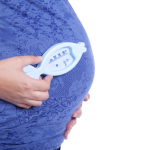 Pregnancy and its aftermath can be tough on your thyroid system. The mother’s body goes through tremendous changes during pregnancy, as any mother can attest. One of my professors in medical school, while he was explaining the great changes in blood tests that occur in pregnancy, said “There are three kinds of people in the world, males, females, and pregnant females.” Obviously, the entire process of creating and delivery a human being into the world can be both miraculous and stressful on the body. In fact, pregnancy is the number one cause of Wilson’s Temperature Syndrome (WTS) with its persistent low body temperatures and low thyroid symptoms.
Pregnancy and its aftermath can be tough on your thyroid system. The mother’s body goes through tremendous changes during pregnancy, as any mother can attest. One of my professors in medical school, while he was explaining the great changes in blood tests that occur in pregnancy, said “There are three kinds of people in the world, males, females, and pregnant females.” Obviously, the entire process of creating and delivery a human being into the world can be both miraculous and stressful on the body. In fact, pregnancy is the number one cause of Wilson’s Temperature Syndrome (WTS) with its persistent low body temperatures and low thyroid symptoms.
Interestingly, many people with WTS actually fare quite well during pregnancy. Their temperatures can come up and their low thyroid symptoms can go away and they can have a lot of energy. One possible explanation for this is that the placenta secretes a hormone that has been shown to be very similar in structure to thyroid stimulating hormone (TSH). This hormone, called Human Chorionic Gonadotropin, can increase thyroid hormone production and decrease TSH. It’s after giving birth that most WTS sufferers struggle. Their temperatures can drop and they can suffer postpartum depression, fatigue, anxiety, trouble losing weight, and many other low thyroid symptoms even though their thyroid blood tests are normal. They may have problems converting T4, the inactive form of thyroid hormone, to T3, the active form. Or their cells may be “resistant” to T4. These are problems that do not show up on the blood test commonly used to screen for thyroid problems–the TSH test–but low metabolism is easily detected another way: consistently low body temperature.
I suggest you check you take your temperature by mouth, every 3 hours, three times a day, starting 3 hours after waking. Do it for several days, then average your temperature for each day. (For detailed information, see “How Are Body Temperatures Measured?”) If your temperature is consistently low, below 97.8 F (36.56 C) you may be suffering from Wilson’s Temperature Syndrome.
A simple course of several months of T3 therapy–and, of course, taking your temperature daily to see if it comes up to normal–will help determine if, indeed, your symptoms are being caused by slow metabolism due to low T3.
You can discuss taking a course of T3 with your doctor. Your doctor can call us at 800.420.5801 800.420.5801 or 800.420.5801
800.420.5801 or 800.420.5801 800.420.5801 to get more information about how to use T3 and to discuss your individual case.
800.420.5801 to get more information about how to use T3 and to discuss your individual case.
Research also shows that getting enough iodine and selenium during pregnancy can help protect your thyroid gland. It’s important to give your thyroid the nutritional support it needs–before, during and after pregnancy.
For about a year after giving birth, a woman is at the highest risk of any time in her life to develop thyroid problems. Her gland may be first overactive, then underactive. A woman can develop antibodies to her thyroid tissue, a condition called Hashimoto’s thyroiditis. About 7 percent of women develop such problems. Sometimes the problems resolve on their own, over time. But some women have ongoing problems that can benefit from treatment.
REFERENCES
Azizi F. The occurrence of permanent thyroid failure in patients with subclinical postpartum thyroiditis. Eur J Endocrinol 2005; 153:367.
Masayoshi Yoshimura and Jerome M. Hershman. Thyroid. October 1995, 5(5): 425-434
Glinoer D What happens to the normal thyroid during pregnancy? Thyroid. 1999 Jul;9(7):631-5.
Stagnaro-Green A, Abalovich M, Alexander E, et al. Guidelines of the American Thyroid Association for the diagnosis and management of thyroid disease during pregnancy and postpartum. Thyroid 2011; 21:1081.

I am finding it difficult to find the list of ingredients of this product. I am sure you do have the ingredients listed somewhere, but I am finding it hard to locate. This seems to me to be a flaw of your website.
Best wishes,
Catherine Sinkys
Hi Catherine,
T3 is a medicine that is compounded by pharmacists according to a prescription (http://www.wilsonssyndrome.com/patients/pharmacies/). Best regards :)
I’m 9 months postpartum about 2 months ago I suffered extreme anxiety/panic attack which caused severe heart palpitations and shortness of breath. I’ve been suffering from constipation, fatigue, difficulty losing weight and dry, itchy skin for months as well. I got checked out in the ER, as well as have had my thyroid tested, my heart is ok and thyroid tests came back normal. Through diet, I’ve managed to get back to feeling mostly normal, except I’ve had heart palps that I continue to feel on an almost daily basis, and still have fatigue and difficulty staying asleep. I’ve been wondering about wilson’s syndrome, but heart palpitations can get worse going on t3, so would this help me or hurt me more if I’m already experiencing heart palpitations? I do seem to have low body temps throughout the day as well…
There are measures that can be taken that may get your heart function calmed down and ready for T3 therapy. Just have your doctor call us at 800 420 5801 to discuss your case.